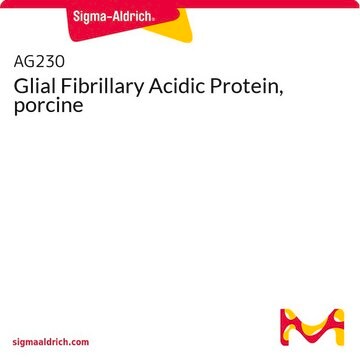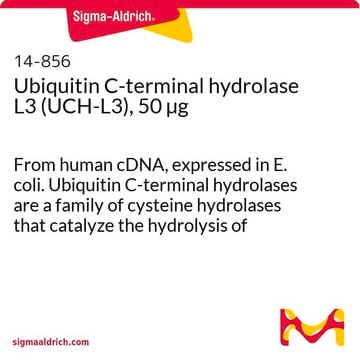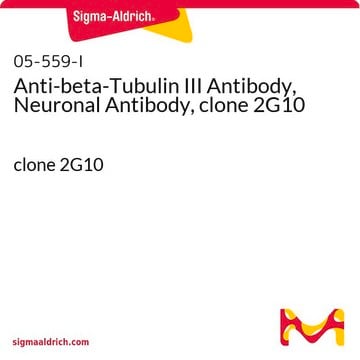14-855
Ubiquitin C-terminal hydrolase L1 (UCH-L1), 50 µg
From human cDNA, expressed in E. coli. Ubiquitin C-terminal hydrolases are a family of cysteine hydrolases that catalyze the hydrolysis of amides, esters & thioesters of the C-terminus of ubiquitin.
登录查看公司和协议定价
所有图片(1)
About This Item
分類程式碼代碼:
12352200
eCl@ss:
32160405
NACRES:
NA.32
推荐产品
生物源
human
品質等級
重組細胞
expressed in E. coli
比活性
>1000 pmol/min-μg, 25 °C (with 1 μM ubiquitin-AMC as substrate and UCH-L1 at 20 pM (0.54 ng/mL).)
分子量
Mw 24.8 kDa
製造商/商標名
Upstate®
NCBI登錄號
UniProt登錄號
運輸包裝
dry ice
一般說明
Produced from human cDNA, expressed in E. coli. Ubiquitin C-terminal hydrolases (UCHs) are a family of cysteine hydrolases that catalyze the hydrolysis of amides, esters and thioesters of the C-terminus of ubiquitin. Mammalian neuronal cells abundantly express a deubiquitylating enzyme, ubiquitin carboxy-terminal hydrolase 1 (UCH-L1). Mutations in UCH-L1 are linked to Parkinson′s disease as well as gracile axonal dystrophy (gad) in mice. In contrast to the universally expressed UCH-L3 isozyme, UCH-L1 is expressed exclusively in neurons and testis/ovary. It has been shown that UCH-L1 associates and co-localizes with monoubiquitin and elongates ubiquitin half-life and the suggestion is made that UCH-L1, with avidity and affinity for ubiquitin, ensures ubiquitin stability within neurons.
Product Source: Recombinant human UCH-L1 expressed in E. coli
儲存和穩定性
As supplied, store at -80°C for up to 12 months from date of receipt. Avoid repeated freeze/thaw cycles. After initial defrost, aliquot (for extended storage it is recommended that aliquots be no smaller then 10 μL) and store at -80°C. Snap-freezing in a dry ice/ethanol bath or liquid nitrogen is recommended. As supplied, the enzyme is stable on ice for several hours.
法律資訊
UPSTATE is a registered trademark of Merck KGaA, Darmstadt, Germany
免責聲明
Unless otherwise stated in our catalog or other company documentation accompanying the product(s), our products are intended for research use only and are not to be used for any other purpose, which includes but is not limited to, unauthorized commercial uses, in vitro diagnostic uses, ex vivo or in vivo therapeutic uses or any type of consumption or application to humans or animals.
儲存類別代碼
12 - Non Combustible Liquids
水污染物質分類(WGK)
WGK 1
閃點(°F)
Not applicable
閃點(°C)
Not applicable
I N Day et al.
FEBS letters, 210(2), 157-160 (1987-01-05)
The co-ordinate sequencing of the human neuronal and neuroendocrine marker protein PGP 9.5 and its cDNA is described. The cDNA encodes the complete protein (212 amino acids), and the 340 nucleotide 3'-noncoding region including the polyadenylation signal, indicating an mRNA
I N Day et al.
The Biochemical journal, 268(2), 521-524 (1990-06-01)
Database search using a bovine thymus ubiquitin C-terminal hydrolase sequence indicated 54% sequence identity with the abundant human neuron-specific protein gene product 9.5 (PGP9.5), which was then shown to possess the same activity [Wilkinson, Lee, Deshpande, Duerksen-Hughes, Boss & Pohl
C N Larsen et al.
Biochemistry, 35(21), 6735-6744 (1996-05-28)
Ubiquitin C-terminal hydrolases (UCH's) are a newly-defined class of thiol proteases implicated in the proteolytic processing of polymeric ubiquitin. They are important for the generation of monomeric ubiquitin, the active component of the eukaryotic ubiquitin-dependent proteolytic system. There are at
Kinetic and mechanistic studies on the hydrolysis of ubiquitin C-terminal 7-amido-4-methylcoumarin by deubiquitinating enzymes.
Dang, L C, et al.
Biochemistry, 37, 1868-1879 (1998)
Yichin Liu et al.
Cell, 111(2), 209-218 (2002-11-01)
The assumption that each enzyme expresses a single enzymatic activity in vivo is challenged by the linkage of the neuronal enzyme ubiquitin C-terminal hydrolase-L1 (UCH-L1) to Parkinson's disease (PD). UCH-L1, especially those variants linked to higher susceptibility to PD, causes
我们的科学家团队拥有各种研究领域经验,包括生命科学、材料科学、化学合成、色谱、分析及许多其他领域.
联系技术服务部门








